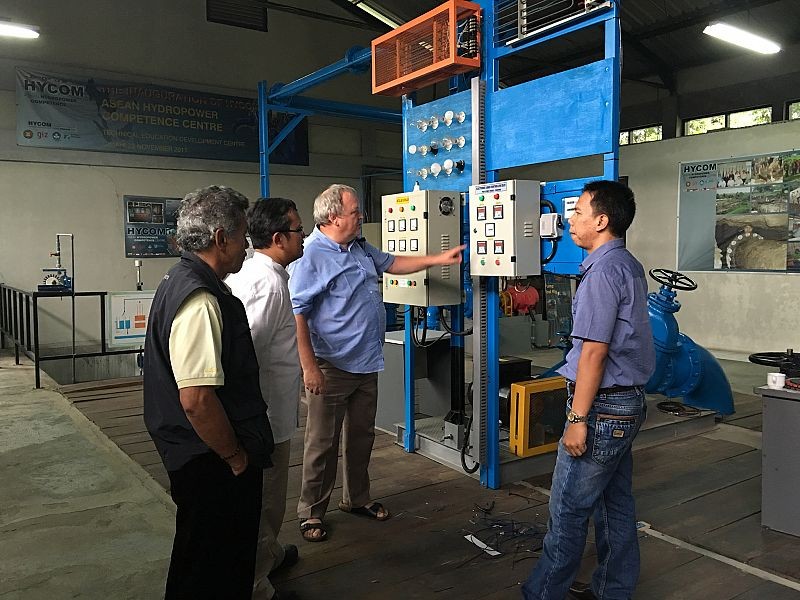The purpose of this exchange is to increase the technical and economic sustainability of micro-hydro projects.
 When comparing inherent aspects of different mini-grid technologies, micro-hydropower (MHP) has clear advantages: (a) far lower investment costs and levelized cost of electricity; (b) no need for battery storage; and (c) the reliable technology can be procured locally.
These advantages make MHP the most economically viable mini-grid technology for rural communities with agricultural-based productive end uses. However, most MHP projects generate excess electricity and operate at low plant load factors, which also leads to low levels of feed collection and to financial difficulties for many MHP projects. Most could achieve greater economic impact by technically and socially integrating quality technology that supports high productive end use.
The purpose of this exchange is to increase the technical and economic sustainability of micro-hydro projects. To that aim, a set of three knowledge-sharing tools will be developed to collect and systematise knowledge and experience from micro-hydro practitioners from South and South-East Asia. The tools will cover the following topics:
1. The Micro-Grid Code
This guideline document will set standards for environmental impact, civil construction, transmission and distribution, and electro-mechanical hardware.
2. Centralised Micro-Hydro Technology Database
This live database will make information about MHP suppliers accessible in all HPNET countries, including details that help to determine the standard of quality.
3. Training Module: Increasing MHP Load Factor
a. Simulation tools to help village stakeholders understand the need for the electronic load controller;
b. Indicator and monitoring device that assists households and developers to analyse and optimise their MHP usage;
c. Local workshop to test and refine the tools.
When comparing inherent aspects of different mini-grid technologies, micro-hydropower (MHP) has clear advantages: (a) far lower investment costs and levelized cost of electricity; (b) no need for battery storage; and (c) the reliable technology can be procured locally.
These advantages make MHP the most economically viable mini-grid technology for rural communities with agricultural-based productive end uses. However, most MHP projects generate excess electricity and operate at low plant load factors, which also leads to low levels of feed collection and to financial difficulties for many MHP projects. Most could achieve greater economic impact by technically and socially integrating quality technology that supports high productive end use.
The purpose of this exchange is to increase the technical and economic sustainability of micro-hydro projects. To that aim, a set of three knowledge-sharing tools will be developed to collect and systematise knowledge and experience from micro-hydro practitioners from South and South-East Asia. The tools will cover the following topics:
1. The Micro-Grid Code
This guideline document will set standards for environmental impact, civil construction, transmission and distribution, and electro-mechanical hardware.
2. Centralised Micro-Hydro Technology Database
This live database will make information about MHP suppliers accessible in all HPNET countries, including details that help to determine the standard of quality.
3. Training Module: Increasing MHP Load Factor
a. Simulation tools to help village stakeholders understand the need for the electronic load controller;
b. Indicator and monitoring device that assists households and developers to analyse and optimise their MHP usage;
c. Local workshop to test and refine the tools.
Projects with same technology
Implementation of Low Head Micro Hydro to Support Clean Water Supply for a Boarding School
This project aims to install a 10 kW low-head Micro-Hydro Plant (MHP) along a riverside, generating power for a nearby school
Developing Alternative Sustainable Income-Generating Activity by the Efficient Use of Surplus Energy From an Existing Micro-Hydro Plant
This project aims to pilot a water lifting technology for irrigation and an associated off-season vegetable farming enterprise
Projects in same country
Exchange: A Participatory Gaming Approach To Community Energy Planning in Southeast Asia: Spreading Best-Practices on Community Engagement
To increase community understanding of mini-grid design, management and operation
Integrating Watershed Development and Conservation in the Ancestral Forests of Ulu Papar
In this project, Green Empowerment and Tonibung seek to improve the socioeconomic and environmental well being of the villages of Pongobonon, Lokogungan and Kalangaan in Malaysia.